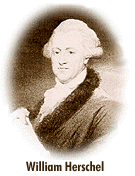A Surprising Find
Then William Herschel, an amateur British astronomer, became the first person in recorded history to discover a planet.
 Herschel
was a music teacher with an intense interest in astronomy. He turned his
house into a telescope factory, to his sister's dismay, and crafted instruments
superior to the telescopes at the Royal Observatory. Herschel devoted
much of his time to observing and charting the skies. In March, 1781,
he was in the middle of his second all-sky survey when he came upon what
he called "a curious either nebulous star or perhaps a comet." Its orbit,
however, was not that of a comet.
Herschel
was a music teacher with an intense interest in astronomy. He turned his
house into a telescope factory, to his sister's dismay, and crafted instruments
superior to the telescopes at the Royal Observatory. Herschel devoted
much of his time to observing and charting the skies. In March, 1781,
he was in the middle of his second all-sky survey when he came upon what
he called "a curious either nebulous star or perhaps a comet." Its orbit,
however, was not that of a comet.
It was Nevil Maskelyne, astronomer royal, who first suggested Herschel's comet might be a planet. Mathematical proof of this was soon forthcoming, and once the orbit was calculated, Herschel's discovery doubled the size of the solar system. This was a crowning achievement for English astronomy, and Herschel quickly turned professional, receiving a royal stipend so he could devote his time to science.
The discoverer had the honor of christening the planet, and Herschel proposed Georgium Sidus (George's Star) in honor of King George III. However, the French mathematician who had helped to calculate the orbit proposed the name Herschel, while Johann Bode, editor of the Astronomical Yearbook for Berlin, suggested Uranus to keep the planet names tied to mythology. Georgium Sidus was quite unpopular outside of England, being named for George III, whom the American colonists had declared a tyrant, and against whom they had recently fought their war for independence.
The name Uranus was immediately accepted in Germany, and eventually found favor in France and the rest of the world. Yet for the next 60 years in England, Herschel's discovery was referred to as the Georgian Planet.